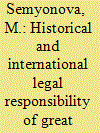|
|
|
Sort Order |
|
|
|
Items / Page
|
|
|
|
|
|
|
| Srl | Item |
| 1 |
ID:
188496


|
|
|
|
|
| Summary/Abstract |
GREAT BRITAIN, once the biggest colonial power, steadily expanded by way of the natural resources of its controlled possessions, the export of their cultural values, and the slave trade. The empire's political and economic vibrancy required strong moral "tenets" that led to the formation of a hypocritical ideology - an alloy of cynical prosperity on the "bones" of enslaved peoples, enlightening messianism, and the heavy "white man's burden" as an alleged source of progress for the rest of the world. Colonialism was and remains, to an extent, a factor of national pride, a combination of imagined racial-ethnic exceptionalism and a condescending attitude toward others. Hence the more or less widely accepted opinion among Britons that the demands, especially of India and Pakistan, that Great Britain repent for the sins of the colonial past are untenable, since under imperial patronage, these countries enjoyed all the boons of civilization, democracy, and free trade.
|
|
|
|
|
|
|
|
|
|
|
|
|
|
|
|
| 2 |
ID:
142990


|
|
|
|
|
| Summary/Abstract |
Five years ago, the total number of U.S. military personnel in the Persian Gulf was over 230,000. Today, that number is well under 50,000. The rapid exit of so many U.S. fighting men and women has caused many observers to fear for the future of the Gulf. As one analyst put it, the regional forecast is bleak with “violence, followed by intermittent violence, and renewed violence.”
|
|
|
|
|
|
|
|
|
|
|
|
|
|
|
|
| 3 |
ID:
149433


|
|
|
|
|
| Summary/Abstract |
By analyzing Turkey’s relations with Great Britain and the US in a period of drastic change (1929–47), this article argues that the origins of the shift in the orientation of Turkish foreign policy from Pax Britannica to Pax Americana not only affected the perceptions and strategies of relevant powers, but also entailed a dynamic interactive process. It asserts that the transition featured aspects of significant change, as well as continuity for the region. It demonstrates that while attempting to bandwagon with the relatively stronger naval, military, and economic partner, Turkey also endeavored to pursue a more autonomous foreign policy at various stages of this transition.
|
|
|
|
|
|
|
|
|
|
|
|
|
|
|
|
| 4 |
ID:
156005


|
|
|
| 5 |
ID:
112457


|
|
|
|
|
| Publication |
2012.
|
| Summary/Abstract |
This article provides foundations to Polanyi's famed argument that monopoly power in the global capital market served as an instrument of peace during the Pax Britannica (1815-1914). Our perspective is novel-we focus on the role of intermediaries and certification. We show that when information and enforcement are imperfect, there is scope for the endogenous emergence of "prestigious" intermediaries who enjoy a monopoly position and as a result, control government actions. They can implement conditional lending: they subject the distribution of credit to the adoption of peaceful policies. Prestigious intermediaries act that way because of their concern with maintaining an unblemished track record when wars increased risks of default. Our analysis, which brings together insights from different disciplines, provides a significant extension to, and departure from, recent research on how countries accumulate reputational capital.
|
|
|
|
|
|
|
|
|
|
|
|
|
|
|
|
| 6 |
ID:
178362


|
|
|
|
|
| Summary/Abstract |
Sir Arthur Hirtzel, the long-serving senior official in the India Office was an old – and a much respected – Middle Eastern hand. Few in Whitehall could rival him in his capacity ‘to get into the mind of the man at the other end of the line.’ Surprisingly, perhaps, Hirtzel never visited the region and never set foot in India, with which he was so intimately connected in an official capacity. As this examination of his role during the First World War and its immediate aftermath shows, Hirtzel’s perspicacity concerning key political and military developments, as well as the opportunities and the constraints presented by the war, was striking. Notable was his percipience in predicting the import of Wilsonian idealism for Britain’s ambitions in the wider Middle Eastern region. So too was his ability to adapt policy to the changing international environment. He also foresaw the considerable difficulties, especially financial pressures, which would arise in Iraq and affect British control there.
|
|
|
|
|
|
|
|
|
|
|
|
|
|
|
|
|
|
|
|
|